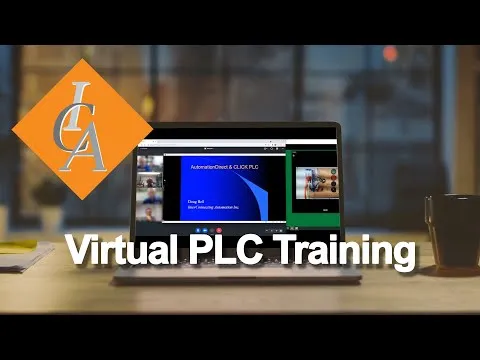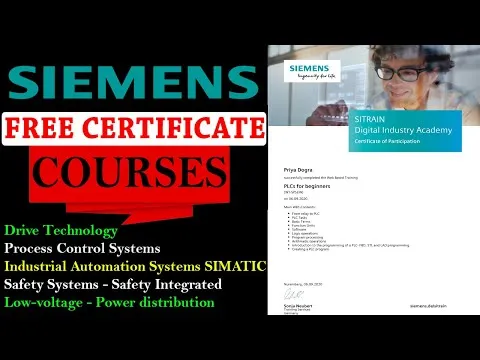
Best way to learn PLC programming 
Looking to master PLC programming quickly? Look no further! Discover the best way to learn Automation PLC Skills with this dynamic and engaging course. Designed to provide a fast and efficient learning experience, this course covers all the essential aspects of PLC programming. Whether you're a beginner or an experienced professional, this course will equip you with the knowledge and skills needed to excel in the field. Don't miss out on this opportunity to enhance your career prospects and become a PLC programming expert. Enroll now and unlock your potential! #shorts #plc ▼
ADVERTISEMENT
Course Feature
![]() Cost:
Cost:
Free
![]() Provider:
Provider:
Youtube
![]() Certificate:
Certificate:
No Information
![]() Language:
Language:
English
![]() Start Date:
Start Date:
2023-06-03 00:00:00
Course Overview
❗The content presented here is sourced directly from Youtube platform. For comprehensive course details, including enrollment information, simply click on the 'Go to class' link on our website.
Updated in [September 26th, 2023]
We considered the value of this course from many aspects, and finally summarized it for you from two aspects: skills and knowledge, and the people who benefit from it:
(Please note that our content is optimized through artificial intelligence tools and carefully reviewed by our editorial staff.)
What skills and knowledge will you acquire during this course?During this course, learners will acquire the following skills and knowledge:
1. Understanding of PLC (Programmable Logic Controller) basics: Learners will gain a comprehensive understanding of the fundamental concepts and principles of PLC programming.
2. PLC programming languages: They will learn various programming languages used in PLC programming, such as ladder logic, function block diagrams, structured text, and sequential function charts.
3. PLC hardware and software: Learners will become familiar with different types of PLC hardware components and their functions. They will also gain hands-on experience with PLC software, including programming tools and simulation environments.
4. PLC troubleshooting and debugging: The course will equip learners with the skills to identify and resolve common issues that may arise during PLC programming. They will learn techniques for troubleshooting and debugging PLC programs effectively.
5. Industrial automation concepts: Learners will gain knowledge about industrial automation systems and their applications. They will understand how PLCs are used in various industries for process control, monitoring, and automation.
6. PLC communication protocols: The course will cover different communication protocols used in PLC systems, such as Modbus, Profibus, and Ethernet/IP. Learners will learn how to establish communication between PLCs and other devices.
7. PLC integration with HMI (Human-Machine Interface): They will acquire the skills to integrate PLCs with HMIs, allowing for user-friendly visualization and control of industrial processes.
8. Safety considerations in PLC programming: Learners will understand the importance of safety in PLC programming and learn about safety standards and practices to ensure the protection of personnel and equipment.
9. Project-based learning: The course will provide opportunities for learners to work on real-world projects, allowing them to apply their acquired skills and knowledge in practical scenarios.
By the end of this course, learners will have a solid foundation in PLC programming and automation skills, enabling them to design, program, and troubleshoot PLC systems effectively.
Who will benefit from this course?
This course on learning PLC programming will benefit individuals and professionals who are interested in or working in the field of automation and control systems. Specifically, it will be beneficial for:
1. Electrical Engineers: This course will provide electrical engineers with the necessary skills to design, program, and troubleshoot PLC systems, which are widely used in industrial automation.
2. Automation Engineers: Automation engineers will benefit from this course as it will enhance their understanding of PLC programming, enabling them to develop efficient and reliable automation solutions.
3. Control System Engineers: Control system engineers will find this course valuable as it will equip them with the knowledge and skills to integrate PLCs into complex control systems, ensuring smooth operation and optimal performance.
4. Maintenance Technicians: This course will be beneficial for maintenance technicians who work with PLC-based systems. It will enable them to effectively diagnose and resolve issues, minimizing downtime and improving system reliability.
5. Industrial Technologists: Individuals working in industrial settings, such as manufacturing plants, will benefit from this course as it will provide them with the skills to program and operate PLCs, allowing them to optimize production processes and improve efficiency.
6. Students and Aspiring Professionals: Students pursuing a career in automation or control systems, as well as individuals looking to switch careers, will find this course helpful in acquiring the fundamental knowledge and skills required for PLC programming.
Course Provider

Provider Youtube's Stats at AZClass
Discussion and Reviews
0.0 (Based on 0 reviews)
Explore Similar Online Courses

Siemens FREE Online Course Certification - Siemens PLC and Industrial Automation Course Certificate

5 STEPS to take ABSOLUTELY EPIC landscape PHOTOS : with any lens!

Python for Informatics: Exploring Information

Social Network Analysis

Introduction to Systematic Review and Meta-Analysis

The Analytics Edge

DCO042 - Python For Informatics

Causal Diagrams: Draw Your Assumptions Before Your Conclusions

Whole genome sequencing of bacterial genomes - tools and applications

NEW : Live online PLC training classes from InterConnecting Automation at AutomationDirect

Siemens FREE Online Courses with Certificate - PLC and Automation Course Certification


Start your review of Best way to learn PLC programming